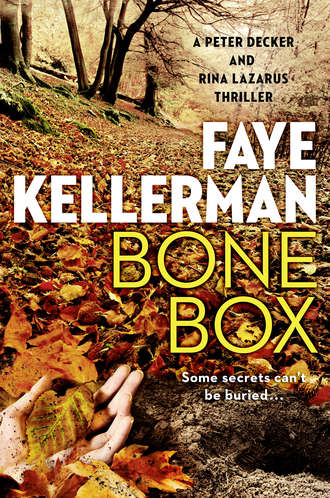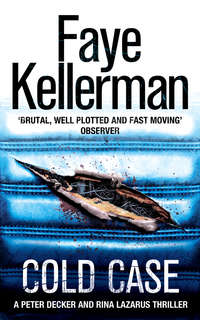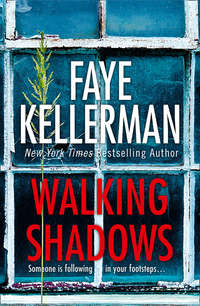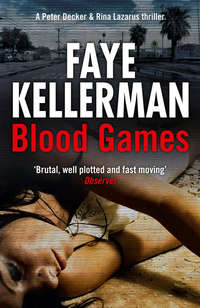
Полная версия
Bone Box
Chapter Ten
The medical practice was in the East Village, near Washington Square and in a maisonette that fronted a six-story residential brick building. Dr. Elwood Marshall specialized in cosmetic and reconstruction surgery, and judging by the amount of people in the waiting room, he did well. All the couches and chairs were taken, and there was a small line at the reception window. Decker waited his turn and it took almost eight minutes before he faced a heavily made-up receptionist wearing a brunette wig of long waves. A pretty woman in that extreme way, except the voice told another story. It was beyond throaty: it was deep as in a well-developed Adam’s apple. The name tag said Eloise.
“Can I help you?”
Decker discreetly took out his official ID. “We have an appointment with Dr. Elwood.”
“We?”
Decker looked around until he spotted McAdams leafing through the magazine entitled Gay Today. If he could have beaned the kid from across the room, he would have done it. He looked back at Eloise, the receptionist. “My detective seems to have found some interesting reading material.”
“People have all sorts of interesting facets to their personality.” Her smile was a smirk. “I’ll tell the doctor you’re here. It may take a few minutes. We’re swamped today.”
Decker thanked her and the glass partition slid closed in front of him. He walked over to McAdams and elbowed him hard. He whispered, “Learning something?”
“There are some real hot-looking dudes in this magazine.” He put it down on the table. “If I were gay, I wouldn’t stand a chance. Lucky for me that women just aren’t that picky.”
Decker stifled a laugh. “Try to concentrate on the investigation, Tyler. It’s what you’re being paid to do.”
“You mean that paltry sum that’s handed to me twice a month?”
“You were the one who turned down those cushy, well-paid internships.” Decker heard someone call his name. “That’s us. C’mon, Harvard. Let’s go find some answers.”
They were escorted into an office that looked out on a small back garden. The sun had ducked behind clouds, leaving the foliage to grow in gray, sooty light. The air-conditioning was running full blast. The nurse was tall with long thin hands. He said, “The doctor will be with you as soon as he can. Have a seat.”
There were two wooden chairs and one plush leather desk chair separated by a large, rosewood desk holding one pile of paperwork, a bamboo file organizer, a cup of pens, a stapler, and a large phone that had many blinking lines. The walls were covered with diplomas and certifications. Ten minutes after the detectives were seated, a white-coated man in his mid to late fifties flew in like a rogue gust of wind. He was medium in stature with a paunch that lay over a Gucci belt. He had a long face with wiry, silver hair and eyes somewhere between tawny and brown. He sat down at his desk chair and extended his hand to both detectives. “How can I help?”
“As I told your receptionist over the phone, it has to do with a case we’re working on involving one of your former patients.”
“And I suppose you know that even if we’re dealing with former patients, there is confidentiality. Who are we talking about? My receptionist didn’t say.”
Decker said, “We found some remains up north in Greenbury near the Five Colleges of Upstate. We have a tentative match to Lawrence Pettigrew. Lorraine Pettigrew.”
Marshall sat back in his chair, a pained look on his face. “That’s awful.” He regarded Decker. “Because the police are involved … was it murder?”
“Yes.”
“How?”
“The developments are recent, but the murder was not. He has been dead for quite some time. Anything you can tell me about him would be helpful.”
“Like what?”
“Did he confide in you on personal matters, for instance?”
“They all confide in me on personal matters. When people come to me, they are very confused and very emotional. I’m just as much therapist as I am surgeon.”
“What about Pettigrew?”
“He was no exception.”
“Anything specific that you can tell me?”
Marshall picked up the phone. “Donnie, can you get me Lawrence/Lorraine Pettigrew’s file, please?” After he hung up the receiver, he said, “It’s been a while. From what I recall, he was very gung-ho on having surgery. When I first see them, they usually are. I always go slowly. Any change, be it a nose job or breast implants, takes getting used to. Let alone something as drastic as sex reassignment surgery. I start with the face. We did some skin sanding, some hair removal. He did well with those procedures, so we took the next step.”
“Which was?”
“Hormonal therapy.” A moment later, Donnie came in with the file and then left. Marshall began to skim through it.
“Yes, I put him on a low dose of the appropriate hormones needed to override the androgens. That’s when the problems started. He didn’t like how it made him feel. He said … this is what I wrote down … it made him feel on edge and moody.”
“PMS,” McAdams said.
“Yes, it does mimic some symptoms in some people. But with time, most transgender people adjust to it. Lawrence not only disliked how it made him feel, he also didn’t like the changes in his body.”
“Meaning?”
“He liked losing his body hair, but he didn’t like having actual breasts although he had been dressing with prosthetics for two years. He loved the way he looked in women’s clothing. But he didn’t like looking at his naked body.” Marshall looked at the chart. “He said he didn’t feel beautiful as a man or a women, just some kind of weird chimera. Now, adjustment can take months. But he didn’t seem to want to adjust. So we began to talk about alternatives.”
“Which are?”
“His problem was not that unusual. There are many men who feel as he did. They consider themselves women in men’s bodies. They are attracted to men. But they don’t want to do the last, fateful step because they can’t adjust to their bodies as women.”
“Okay,” Decker said. “I talked to a few of Pettigrew’s friends. Karen Osterfeld and her current partner, Jordeen Crayton. I believe that Pettigrew intended to marry Karen Osterfeld, who was Karl Osterfeld back then.”
Marshall said nothing.
“Do you know anything about that?”
“If I did, I wouldn’t say. Karen Osterfeld is still very much alive.”
“And she’s your patient?”
“You know I can’t say anything.”
“How about if she gave you permission to talk to me?”
Marshall said, “Has she?”
“I haven’t asked her.”
“So then there’s nothing to talk about.” Marshall stood up. “I hope I’ve been helpful. I have examination rooms filled with patients. I really must get on with them.”
Decker said. “I have one more question. Since Lawrence didn’t adjust to his womanly body, I assume that sex reassignment surgery was off the table.”
“Yes, of course. It was not appropriate for him. He kept on with hormones but at an even lower dose. And he wanted to continue with cosmetic dermabrasion and laser hair removal. I didn’t have a problem with that.”
“Did he do those procedures here?”
“Yes.”
“And he was still your patient up until he disappeared?”
“Yes. As I recall, we found out about his disappearance because he didn’t show to one of his appointments. Pettigrew was usually reliable.”
“His disappearance must have come as a shock to you.”
“It was disturbing, yes. But your news is not just disturbing, it’s awful.” Marshall was silent for a moment. “My patients are often not socially acceptable to their families. The rejection causes them to seek other means of support—a community that understands them in the best of all worlds. But sometimes they seek solace in bad habits—crazy partying, alcohol, drugs, and promiscuous sex. That kind of edgy lifestyle often gets them into deep trouble.”
Getting a caffeine fix in the city was as easy as walking down the block. Small cafés, stores, and take-out markets abounded. The detectives had a little over an hour before their appointment with Harold Cantrell, Pettigrew’s manager at McGregor in Midtown near the UN Plaza.
McAdams sipped iced tea. “We’ve got two Pettigrews: the conventional Lorraine and the in-your-face Lawrence.”
“But both of them were very smart.”
“I’m not denying the intelligence. I’m thinking maybe the conventional Lorraine went up to Morse McKinley to have one last fling as Lawrence. He certainly wasn’t forthcoming to Karen about what he was doing up there.”
“True.”
“If the murder happened up there, shouldn’t we be concentrating on his last days in Greenbury?”
“We’re down here now. We might as well get whatever background we can before we go back up. It’s not like the usual case where time matters. We can be deliberate.”
McAdams said, “What do you think of Pettigrew’s rejection of sex reassignment surgery?”
“In terms of what?”
“Karen, who was Karl back then, thought she was marrying a woman. Maybe she was angry that Pettigrew refused to go through with the surgery?”
“But she herself didn’t go through with the surgery. They obviously came to some kind of understanding. They were having a baby together.” Decker finished his iced coffee. “I mean, what are you thinking? That Karen and Pettigrew got into an altercation and she killed him, dragging his body back up to Greenbury?”
“Maybe she tailed him to Greenbury and caught him in a compromising position. The coroner thinks that Pettigrew was hit from behind by someone shorter than him. Karen is definitely shorter than Pettigrew.”
“I don’t see a pregnant woman lugging around a six-foot-plus body and burying it deep in the woods.”
“Maybe she had help. Maybe Jordeen isn’t as innocent as she makes herself out to be. Isn’t it you who told me to look at the spouse first?”
Decker didn’t answer right away. “Sure. It could be Karen. Maybe they did fight. Accidents happen.”
“Especially if Pettigrew was living a double life.”
“Sure, why not?”
“I hate when you’re noncommittal.”
“Tyler, I’m not being deliberately vague. I just don’t know what’s going on. But keep the hypotheses coming. It gets my senile brain working.” Decker checked his watch. It was half past noon and their appointment was at one-fifteen. He put a twenty on the table. “If we leave now, we can walk it easily. Let’s go.”
“Want to Uber? It’s like ninety degrees outside.”
“I’m the one in the suit.”
“All the more reason why we shouldn’t walk. You’re going to sweat and then go into an air-conditioned office and you’ll catch a cold.”
“I’ll take my jacket off when I walk. That way, when I put my jacket back on, I’ll be comfortable in an air-conditioned building. C’mon. I need some exercise.”
“Don’t blame me if you collapse from heat prostration.”
“I won’t. Besides, you know CPR.” When McAdams didn’t answer, Decker said, “You did finally take the course, right?”
“I signed up.”
Decker exhaled and walked out of the café. McAdams had to hotfoot it to keep up with him. “Honest Abe, I really meant to do it. The time got away from me.”
“What’s the matter with you, McAdams? I understand taking shortcuts but not when lives depend on it.”
“Mea culpa. I am truly humbled. I promise I’ll take a course once I get settled in school.”
“Not good enough. There’s a life-size doll at the firehouse in Greenbury. As soon as we get back, I’m giving you a few lessons. It won’t be official. You’ll still have to be certified. But it’ll give you a jump start.”
“Are you kidding me?” McAdams protested. “Do you know how many germs have settled in that orifice? C’mon!”
“No excuses, McAdams. End of discussion.”
“Fine.” McAdams rolled his eyes. “Anything else?”
“That’s sir to you.”
“Anything else, sir?”
“Yes, there is, McAdams. Because you were derelict in your duties as a sworn officer of the law, you can carry my jacket.”
UN Plaza was a gleaming skyscraper set in blocks of open space. It was fronted with hedges and concrete barrels and poles with flapping banners depicting its member countries. From Harold Cantrell’s office at the McGregor Fund, Decker could see people gathering in orderly queues, waiting for a tour.
The only chair in the office was behind the desk. Five minutes later, a kid—probably an intern—came in with two folding seats. It seems that Mr. Cantrell was called away to an emergency meeting but should be back shortly.
Shortly was almost a half hour. Cantrell was a slight, thin man in his thirties with a cue-ball head and algae-green eyes. He sat down and shook his head.
“I’m sorry about Lorraine.” He took out a handkerchief and wiped his sweaty forehead. “I’ve been having a bad day, but I suppose a death puts things in perspective. You’re from Greenbury so I’m assuming she was found there.”
“She was.”
“Was she murdered?”
“Unofficially, yes.”
“So what are you doing here?”
“Talking to people who knew her. Trying to re-create her life just before it happened.”
“When did it happen?”
“Probably right after she disappeared.”
“So around five years ago.”
“Yes. I’d like to ask you what you remember about her disappearance.”
“Wow. It was a while ago but you don’t forget things like that. From my standpoint, I didn’t even know she was missing until she didn’t show up on Monday. When she didn’t call in sick, I called her, but it went straight to voice mail. About an hour later, her boyfriend called asking if Lorraine was at work. That’s when we both knew something had happened. I continued to call her boyfriend after that, just to see if there was anything new. After a while …”
He threw up his hands.
“Life goes on.” Cantrell shook his head again.
McAdams said, “You were her boss?”
“Yes. Lorraine was hired as a junior analyst. She was on probation as any new employee would be. She was doing a good job. She had potential. It was really sad.”
“Did you hire her?”
“I was one of the people who interviewed her. She had several rounds of interviews. Everyone was keen on her. She was a smart person and a hard worker. It’s just a shame.”
Decker said, “Did she have any problems with any of her co-workers?”
His nostrils flared. “Why would she have problems with co-workers?”
“It’s what you ask when you’re dealing with murder victims.”
“Oh. Not that I know of.”
“She was transgender,” Decker said. “Anyone have problems with that?”
Cantrell suppressed a laugh. “I can see you don’t know much about McGregor.”
“Enlighten me, Mr. Cantrell.”
“Our investments are socially conscious. We make it a point to be diverse, and as a result, the company appeals to a lot of people who live alternative lifestyles.”
“Just because two people are gay doesn’t mean they get along,” Decker said. “How did she get along with her co-workers?”
“As far as I know, she fit in fine. I don’t know anyone who had a problem with her. She didn’t work here all that long. And she wasn’t in publicity or human resources. She mostly sat at her desk and analyzed stocks.”
“Did she have a specialty?” McAdams asked.
“Not a sector, no. We hired her to work with institutional endowments. A lot of schools have considerable funds but they’re not big enough to hire their own full-time analysts. We have a number of institutions as clients. That’s what attracted Lorraine to our company. She loved working with schools and colleges.”
Decker was writing furiously in his notebook. “Lorraine went to Morse McKinley up north in Greenbury.”
“Yes, I know. She didn’t finish because she was supposed to undergo sex reassignment surgery. She told us everything.”
“She told her partner that she was going up to Morse McKinley the weekend she disappeared,” Decker said. “We know she made it up there, but we don’t know why she went in the first place. By any chance, would it have something to do with the firm?”
“No.” Cantrell was puzzled. “Why would it have something to do with us?”
“Perhaps someone sent her up there to raise awareness of your investment strategy?”
“I was her boss and I certainly didn’t do that. Her job was analysis, not finding new clients.”
“But if she knew someone up north, maybe she went there with the specific goal to recruit new clients.”
“I would never ask her to do something like that. And I couldn’t imagine anyone else asking her to do it.”
“Maybe she was trying to show initiative,” McAdams said.
“This is all speculation on something that happened years ago.”
“I realize that,” Decker said. “But because it happened so long ago, speculation is a part of the investigation.”
“I can appreciate your position, but unfortunately, I have nothing to add.” Cantrell checked his watch. “Anything else?”
Decker stood up and closed his notebook. “Thank you for your time. If I have anything else to ask you, where can I reach you easily?”
“Here’s my card.” Cantrell scribbled on it. “My cell is on the back. It’s terrible what happened to her. I hope you find out who did it.”
McAdams took the card. “Thank you.”
Decker gave Cantrell his card. “And please let me know if you hear of anything.”
“Why would I hear of anything?”
“This has turned into a murder investigation, Mr. Cantrell. Like the police, people speculate. And sometimes they even know what they’re talking about.”
It was a little past two when they left. Clouds that looked like balls of Brillo pads had materialized, blocking out the sun but keeping in the heat, making the city swelter. Decker felt like a walking water balloon.
McAdams pulled out his phone and pressed the Uber app. “Two-minute ETA. You can come or not, but I’m not walking.”
“This time you win. It’s hot.”
They both stood under a dry cleaner’s awning. McAdams said, “I remember going back to school when I was very little dressed in a jacket and tie. When I finally went to boarding school, I was happy about the fact that New Hampshire was quite a bit cooler than New York in September. Of course, once the winter hit, I would have killed to get back into the city. Even if Manhattan was just as cold as New Hampshire—which it rarely was—you see a great deal more of the sun.” He looked at the overcast sky. “Believe it or not.”
A car pulled up.
“Our ride, boss.”
The men hopped in the air-conditioned car and sped off to Park Avenue. An hour later, both men had showered, changed, and were ravenous. Neither had had much beyond coffee, and it was after three. Decker picked up his cell and there were three missed calls from the station house within twenty minutes.
McAdams came in the room rubbing a towel over his curly, wet hair.
Decker said, “Did you get missed calls from Greenbury?”
The kid checked his phone. “Two. Want me to see what’s up?”
“I’ll call. If they’re calling both of us, it’s important.” He connected to the police line. “This is Detective Decker.”
“Oh, hi, Detective, hold on.” Immediately the line went into idle mode.
“What’s going on?” Tyler asked.
Decker shrugged. Captain Mike Radar came on the line. “Are you still in New York?”
“Yes.”
“Is the kid with you?”
“The kid is with me.”
“Put your phone on speaker.”
“This doesn’t sound good.” Decker pressed the speakerphone button. “What’s up?”
“We found another grave. Same area as Pettigrew—guesstimate is around a hundred to two hundred yards away.”
Decker raked his fingers through his wet hair. “When did this happen?”
“The murder? I have no idea.”
“When did you find the remains?”
“Oh, right. About an hour ago. I think you’re right. We’ll need the dogs.”
“We’ll pack up and leave as soon as possible.” He checked his watch. “We’ll try to make it back before seven. We should still have some daylight.”
“Enough for you to see the remains.”
“By remains, do you mean another skeleton?”
“Yes.”
“Male or female?”
“We haven’t gotten to the pelvic area yet, just the human skull. We’ve got some hair but far less and it looks to be shorter than Pettigrew’s hair.”
“What color?”
“Brown. We also found a watch and more than one earring this time. We found seven. Mostly studs and cuffs.”
“Multiple ear piercings. What about nose or tongue piercings?”
“There’s no soft tissue. Maybe there’s a little cartilage so there could be a pierce through it. No tongue, but there might be a stud inside the jaws. The coroner just got here. It would be good to have you here before we dig up any more graves.”
“Good Lord, I hope not.”
“Decker, we’ve got two bodies interred close to each other. I’m no big-city expert, but what are the odds that this is a coincidence?”
“It’s no coincidence.”
“Any thoughts?”
“A lot but they’re a little jumbled right now.”
“Well, unjumble them. It’s not like I can go on Amazon and pick up a copy of Serial Killers for Dummies.”
“I’ll keep that in mind, Mike.” Decker cut the line.
“That would make for interesting reading,” McAdams said. “What can you tell me about serial killers in …” The kid checked his watch. “In ten minutes.”
Decker was about to brush him off, but the question made him think.
“They’re rare, and despite what you’ve been told by TV and movies, they don’t fall into neat categories. Some are smart—or organized as the FBI likes to say. Some are dumb and disorganized. Some are organized sometimes, and disorganized at other times. There are those who kill within race, but others don’t give a damn about the color of the skin. Some have a definite type, for others any type will do. Some stalk, but some don’t. Some are loners, but others have families—wives and kids.
“Almost all of them are opportunistic. If it’s easy and convenient and they’re in the mood, they’ll hit. Most of them—if they have a car—spend lots of time driving around at night, looking for prey. Some have long-distance driving jobs that make looking for prey easy—like truckers or house movers. Some have transient jobs like short-order cooks and work temporary construction crews. But others hold down regular day jobs and prowl around after the wife and kids go to sleep. They clock lots of miles on their cars. It’s not only their transportation, it’s their place of operation.
“That’s the who and the how. As to the why? Your guess is as good as mine. They kill for sexual satisfaction, they kill because it gives them a physical charge that’s exciting, they kill because they’re warped, they kill because they get their jollies playing cat and mouse with the police, the press, and the public. In other words, they kill because they can.”
McAdams said, “That’s the last time I ask you a question.”
Decker checked his watch. “I still have six minutes to go.”
“Is there anything else you’d like to add?”
“Yes, there is as a matter of fact. Maybe it is a serial killer—but right now, let’s not get fixated on that idea. It could be just what you said before: that Karen went up north and found Pettigrew and the Doe we just unearthed were involved in a tryst.”
“A love triangle.”
“Possibly. It also could be that Pettigrew and Doe were murdered at the same time—not sequentially.”
“Okay. Sure. Fair enough. And what if we find other bodies?”
“You’re really into this being a serial killer.”
“I’m just asking a question, Old Man.”
“If we find other bodies, then I’ll revise my thinking accordingly.”
Chapter Eleven
After dropping off Rina, Decker and McAdams headed for the crime scene. They arrived at Bogat just as the sun was sinking behind the horizon. It was cooler in the forest than in town, even cooler than a couple of days ago when they had discovered Pettigrew’s body. The foliage was starting to turn—small peeks of gold and rust. The sky had burst into purples and pinks, and a cricket or two started in song as twilight emerged. Nightfall would hit soon and the woods would become lines and shadows.









